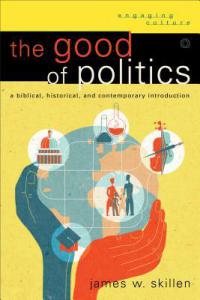
In our current toxic political climate one might ask the question, “can anything good come of politics?” James W. Skillen would answer that affirmatively. In The Good of Politics (Baker, 2014), Skillen’s main contention is that to be created in the image of God means, among other things, that we are political creatures and that political life, along with things like work and family, is part of God’s creation intention for us. It is not a consequence of the fall. Like other aspects of the human condition, political life certainly has been distorted by the fall but part of our call as the redeemed is to bring a redemptive influence into political life.
After laying out the biblical basis for this position in Part One, Skillen goes on in Part Two to survey how the church through history has addressed itself to this question. He covers Augustine’s two cities, the ascendancy of the church over civil government, and the splintering of authority and the two kingdom approach of the Reformers, particularly Luther. Finally he moves to the contemporary scene and the influences of Hobbes and Locke on the American Experiment.
Along the way, he engages the Anabaptist alternative of Hauerwas and Yoder and others that advocates for the kingdom of God as its own political entity and that the church, which is called to peace, should abstain from political engagement which inevitably requires the use of force in restraining evil, including lethal force. He argues that while this may allow the church to maintain its purity, it raises questions about the character of a God who ordains government to restrain evil through the power of the sword. My difficulty with this contention is that these questions are unavoidable no matter whether you are Anabaptist or not and go back to the question of why God permits evil at all. However, like those who would ascribe to some form of just war theory and who take this seriously, he argues that many instances of warfare do not meet this test and should be opposed by Christians.
This last is covered significantly in the third part of the book where Skillen engages the questions of how Christians engage in politics. He explores hot button issues like marriage, family, economics, and the environment. Because this book is an “introduction” he covers a lot of ground. His most interesting sections to me were his discussions of citizenship and the responsibilities all of us have in a republic, and his thoughts on politics in a globalized setting–avoiding nationalism and one world government options while allowing for various regional and other international regimes to deal with the international issues that are inevitable. In this discussion he argues that our situation is not one of a clash of civilizations between country blocks but rather competing claims within many of our countries: secularism, Christianity, capitalism, Islam to name a few.
The one thing I found most impractical was his proposal for “proportional representation” in the House of Representatives of national parties based on voting percentages for each party in elections. What he is trying to do is create a context where parties address national concerns rather than simply being split into electoral base politics. What seems to have a better (though still a long shot to me) chance is redistricting reform that requires districts to make geographic sense and to be demographically representative of a state’s population as far as that is geographically possible. The current gerrymandering of political districts means that one only need cater to one’s base to get elected rather than representing all the people. At least both Skillen and I agree on the problem that makes the House so dysfunctional.
On balance, this is a helpful proposal for how Christians might think about political life and exercise redemptive influence in politics. The most important part of this book is his argument for politics as a result, not of the fall, but the creation. His survey of historical positions is also helpful. His exploration of contemporary issues seemed somewhat cursory, even though he is thoughtful and nuanced. Yet he shows some of the directions Christians might go in pursuing these issues in greater depth.
Editor’s Note: In the midst of political debates and a season for prayerfully considering Jeremiah 29, thank-you to Bob Trube for sharing the above review (recently re-posted at Bob on Books). As always, if you have a book recommendation and/or desire to write a review, please contact ESN 🙂 ~ Thomas B. Grosh IV, Associate Director, Emerging Scholars Network
Bob Trube is Associate Director of Faculty Ministry and Director of the Emerging Scholars Network. He blogs on books regularly at bobonbooks.com. He resides in Columbus, Ohio, with Marilyn and enjoys reading, gardening, choral singing, and plein air painting.

Leave a Reply